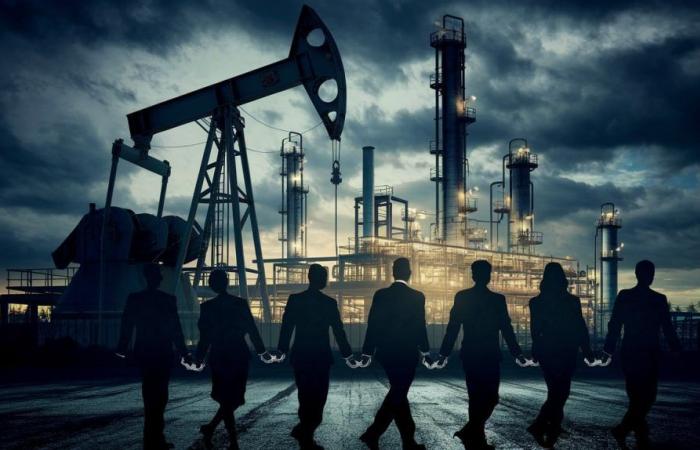???????? Oil earthquake in Venezuela: ex-Oil Minister arrested for serious crimes. Shock twist after the contested presidential election. What is behind this new scandal shaking the giant PDVSA? Deciphering the underside of an explosive affair…
The Venezuelan oil sector, already weakened, has just been hit by a new earthquake with the shock arrest of former Oil Minister Pedro Tellechea, barely three months after a contested presidential election. This strong man of the regime, former CEO of the state giant PDVSA, is accused of “serious crimes against the best interests of the nation”. An explosive twist that once again shakes the country’s oil industry, the world’s largest reserve.
Serious accusations of treason and collusion
According to a press release from the Attorney General, Pedro Tellechea and his closest collaborators are suspected of having delivered a strategic PDVSA system to “a company controlled by the United States intelligence services”. If the details remain unclear, these allegations of collusion with a hostile foreign power are extremely serious in a context of strong diplomatic tensions.
This affair comes as the very controversial re-election of Nicolas Maduro last July continues to shake the country. The opposition calls fraud and claims victory, while the United States, Europe and many Latin American countries refuse to recognize the results. A post-election crisis which has already led to the arrest of more than 2,400 people and left 27 dead according to official sources.
The man who was supposed to right the oil ship
Until recently, Pedro Tellechea, a 48-year-old colonel, was considered the providential man responsible for turning around an oil sector in complete decline. Appointed to everyone’s surprise as Minister of Oil and CEO of PDVSA in August, President Maduro praised his merits: “He has already relieved PDVSA and we must go to the recovery of the industrial park”. But barely three months later, he was unceremoniously ousted in favor of Alex Saab, a sulphurous businessman close to the regime.
However, in the opinion of many observers, Tellechea had begun a timid recovery of an oil sector undermined by American sanctions, corruption and disastrous management. Venezuela is today approaching production of one million barrels per day, its highest level since 2018. An increase favored by the operating licenses granted to Western multinationals despite the embargo.
The specter of a mega-corruption scandal
But this affair also brings to mind the specter of mega-corruption scandals which chronically plague the Venezuelan oil sector. Tellechea himself was propelled to the helm of PDVSA in April following the outbreak of a resounding case targeting his predecessor Tareck El Aissami, accused of massive embezzlement via black oil sales and the fraudulent use of cryptocurrencies.
Prosecutors have launched 27 anti-corruption investigations targeting PDVSA since 2017, with more than 200 arrests, including those of senior executives.Prosecutor Tarek William Saab
These repeated scandals illustrate the extent of the decline of an oil industry plagued by embezzlement. A situation which undermines efforts to recover production and contributes to keeping the country in a deep economic and social crisis.
Geopolitical aftershocks to be expected
Beyond its national impact, this new shock could also have geopolitical aftershocks. The already tense relations between Caracas and Washington risk further worsening if the Venezuelan administration blames external interference. Accusations of collusion with the CIA are sure to fuel the regime’s anti-imperialist rhetoric.
Likewise, the future of licenses granted to Western oil companies appears more uncertain than ever. Their maintenance will largely depend on the evolution of the internal political crisis and diplomatic pressures. A new standoff that could compromise the still fragile recovery of the Venezuelan oil industry.
Obviously, the spectacular arrest of Pedro Tellechea marks a new point of major turbulence for a Venezuelan oil sector tossed from crisis to crisis. An additional indicator of the chronic instability which undermines the potential of this oil giant with feet of clay. The coming weeks will tell whether this umpteenth upheaval is a harbinger of a larger storm.
Until recently, Pedro Tellechea, a 48-year-old colonel, was considered the providential man responsible for turning around an oil sector in complete decline. Appointed to everyone’s surprise as Minister of Oil and CEO of PDVSA in August, President Maduro praised his merits: “He has already relieved PDVSA and we must go to the recovery of the industrial park”. But barely three months later, he was unceremoniously ousted in favor of Alex Saab, a sulphurous businessman close to the regime.
However, in the opinion of many observers, Tellechea had begun a timid recovery of an oil sector undermined by American sanctions, corruption and disastrous management. Venezuela is today approaching production of one million barrels per day, its highest level since 2018. An increase favored by the operating licenses granted to Western multinationals despite the embargo.
The specter of a mega-corruption scandal
But this affair also brings to mind the specter of mega-corruption scandals which chronically plague the Venezuelan oil sector. Tellechea himself was propelled to the helm of PDVSA in April following the outbreak of a resounding case targeting his predecessor Tareck El Aissami, accused of massive embezzlement via black oil sales and the fraudulent use of cryptocurrencies.
Prosecutors have launched 27 anti-corruption investigations targeting PDVSA since 2017, with more than 200 arrests, including those of senior executives.Prosecutor Tarek William Saab
These repeated scandals illustrate the extent of the decline of an oil industry plagued by embezzlement. A situation which undermines efforts to recover production and contributes to keeping the country in a deep economic and social crisis.
Geopolitical aftershocks to be expected
Beyond its national impact, this new shock could also have geopolitical aftershocks. The already tense relations between Caracas and Washington risk further worsening if the Venezuelan administration blames external interference. Accusations of collusion with the CIA are sure to fuel the regime’s anti-imperialist rhetoric.
Likewise, the future of licenses granted to Western oil companies appears more uncertain than ever. Their maintenance will largely depend on the evolution of the internal political crisis and diplomatic pressures. A new standoff that could compromise the still fragile recovery of the Venezuelan oil industry.
Obviously, the spectacular arrest of Pedro Tellechea marks a new point of major turbulence for a Venezuelan oil sector tossed from crisis to crisis. An additional indicator of the chronic instability which undermines the potential of this oil giant with feet of clay. The coming weeks will tell whether this umpteenth upheaval is a harbinger of a larger storm.






